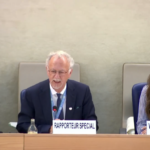


During an interactive dialogue with the UN Special Rapporteur on Minority Issues, Professor Fernand de Varennes, to discuss his most recent report, Humanists International’s Director of Advocacy, Elizabeth O’Casey, made a statement condemning the widespread denial of the rights of minorities by governments fearing that minority values or identity may challenge the dogmatic ideology upon which those in power rely to retain influence and control. She said,
“In every region we see examples of extreme suppression of minorities by governments who dehumanize and exclude them, and who seek to maintain power by fostering division, and fear of minorities.
“We also continue to see the promulgation of religious- and ethno-nationalism to build exclusionary identities and discriminatory narratives, used for the othering of minorities and denying their right to express their individual identity and beliefs.”
She gave a number of examples of where this religious- and ethno-nationalism is being used to deny the rights of minorities of differing religions or beliefs: Right-wing populist governments weaponizing conservative Christian values to legitimize hate towards non-Christian migrants, and other minorities; Hindu nationalists committing violence and hate crimes against Muslims, rationalists, and Dalits; Muslim fundamentalists imprisoning and persecuting Christian, Baháʼí, Ahmadi, and humanist minorities; or Buddhist nationalists committing crimes against humanity against Rohingya Muslims.
O’Casey also pointed out that there is an increasing political hostility to the very human rights system designed to protect minorities and the most vulnerable. She said,
“Authoritarian, populist and fundamentalist regimes and governments are fueling a corrosive narrative that presents majority traditional values and sovereignty as being under attack from the multilateral human rights framework. They seek to ensure that the very system which exists to hold them to account is de-legitimized, disrupted, and dismantled.”

UN Special Rapporteur on Minority Issues, Fernand Varennes
Rapporteur Varennes responded to a question O’Casey posed in terms of how to best tackle these challenges to the human rights system and their implications for minority rights, by reiterating the importance of creating a new treaty on the rights of minorities, which, he said, should include standards on the rights of religious and belief minorities in areas such as education.
This session of the UN Human Rights Council is to be the last one for Professor Varennes as the UN Special Rapporteur on Minority Issues. The session also marks the 30th anniversary of the Declaration on the Rights of Persons Belonging to National or Ethnic, Religious and Linguistic Minorities.
In 2020, Professor Varennes wrote a report for the UN General Assembly which established a significant change in terminology resulting in more inclusivity of the non-religious when it came to minority rights in the UN system. In the report, Professor Varennes emphasised that whilst what had traditionally been termed “religious minorities” did absolutely include those of no religious belief, he noted that “discussions on religious minorities frequently result in non-religious or non-theistic minorities being overlooked.” He therefore concluded that “henceforth, activities and documents under the mandate and United Nations agencies should, whenever possible, use the expression “religious or belief minorities” to more properly encapsulate the scope of minorities this category refers to.”